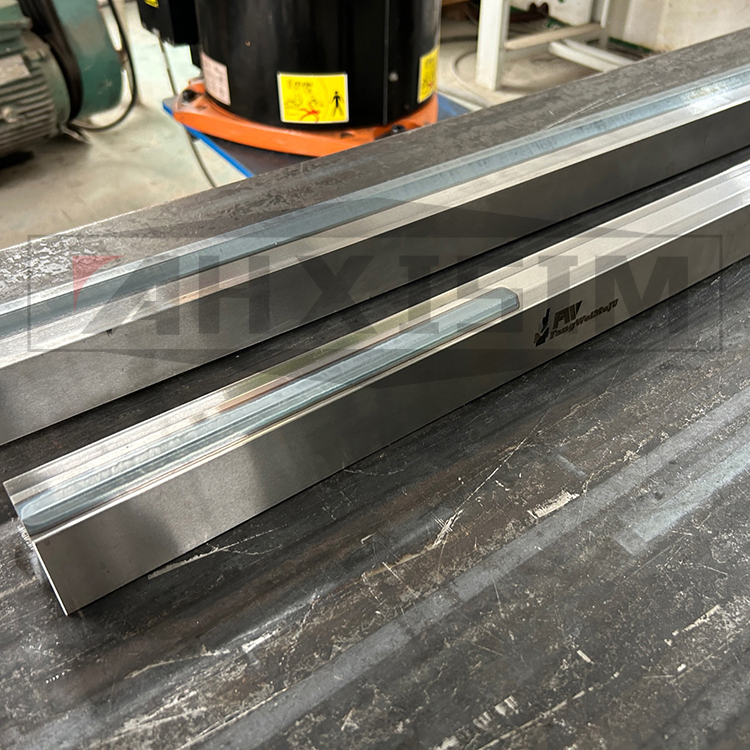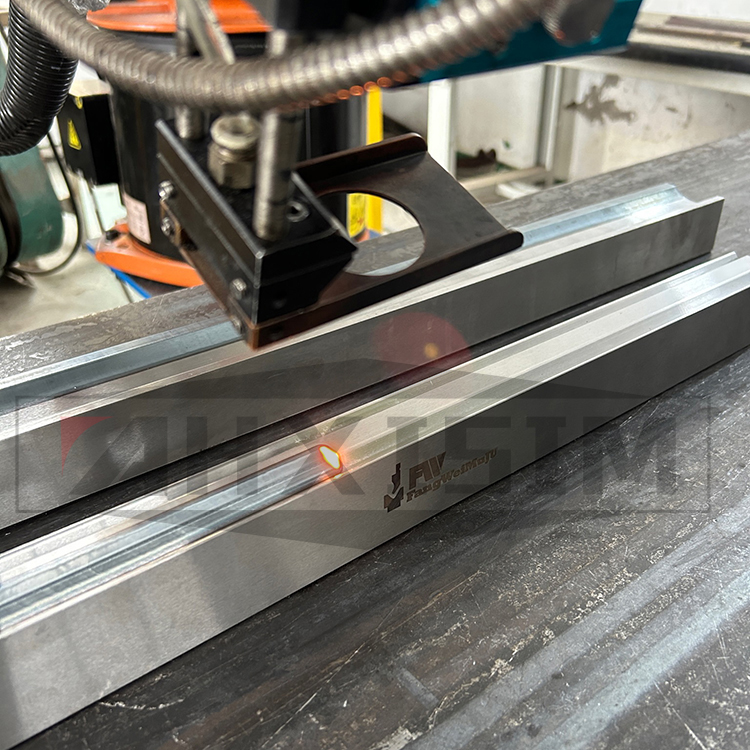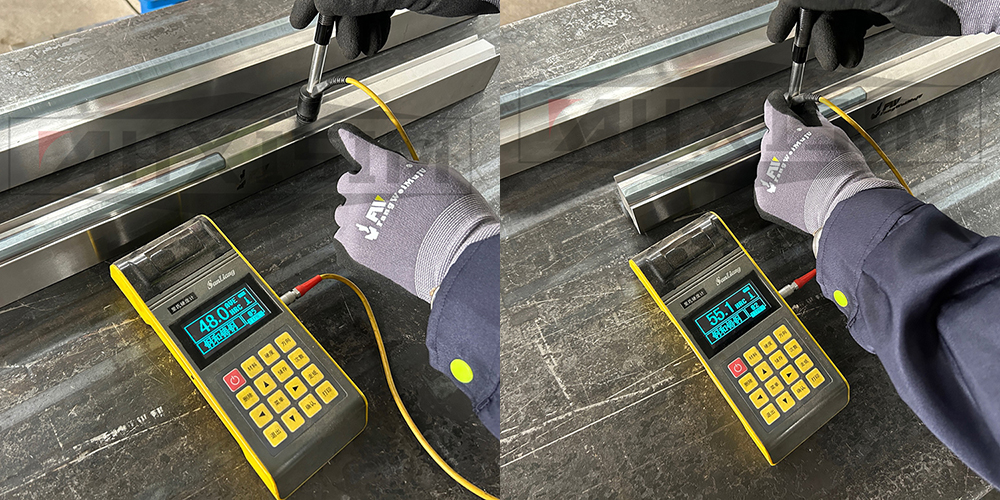Press brake tooling: Laser surface treatment VS No surface treatment
Jun. 28, 2024
Introduction to Press Brake Tooling
The press brake tooling is a mould used by the press brake to shape and process sheet materials. This press brake mould consists of various parts, and different press brake molds are composed of different parts. It mainly achieves the processing of the shape of the object by changing the physical state of the formed material. A press brake mould used to turn a blank into a work-piece with a specific shape and size under the pressure of a press brake.
The press brake tooling is divided into upper and lower molds, which are used for sheet metal stamping and separation molds. The mold used for forming has a cavity, while the mold used for separation has a blade.
Generally, T8, T10, T10A, and even better 42CrMo materials are used, which mainly require high strength, toughness, and good wear resistance. Cold work mold steel is selected Cr12MoV is a very good material. Its performance can meet the requirements, and its process performance is also good. The price will be higher. 42CrMo is a high-strength alloy quenched and tempered steel with high strength and good toughness. It can work below 500 degrees.
Comparison between Laser Surface Hardening and Conventional Heat Treatment
Laser hardening is a high-tech technique for rapidly localized quenching of the surface of metal parts. This process method is used to strengthen the surface of parts, which can significantly improve the surface hardness, wear resistance, corrosion resistance, fatigue performance, strength, and high-temperature performance of metal materials and parts; At the same time, it can maintain good toughness at the center of the parts, so that the mechanical properties of the parts have the characteristics of good wear resistance, high impact toughness, and high fatigue strength. Laser hardening can improve the service capacity of products and extend their service life exponentially. It has significant economic characteristics and is now widely used in industries such as gears, molds, engine cylinder liners, rollers, and crankshafts.
According to the difference in laser energy density when interacting with materials, laser hardening is generally divided into three processes: laser phase transformation hardening (power density of 104-105 W/cm2), laser melting solidification hardening (power density of 105-107 W/c m2), and laser shock hardening (power density of 108 W/c m2 or above). At present, laser phase transformation hardening is widely used in the domestic industry.
The principle of laser phase transformation hardening

Laser phase change hardening is the process of rapidly scanning workpieces with a high-energy (104-105W/cm2) laser beam, causing the surface temperature of the irradiated metal material parts to rise at an extremely fast rate (104-109 ℃/s) above the phase change point (for steel parts: Ac1 or Ac3) and below the melting temperature. When the laser beam leaves the irradiated area, due to the effect of heat conduction, the cold substrate rapidly self quenches the heated surface at a cooling rate of 104-106 ℃/s, thereby achieving phase change hardening of the part surface.
The advantages of laser surface hardening over conventional hardening treatment

Laser surface hardening treatment is suitable for surface strengthening treatment of certain parts and their local positions that cannot be completed or difficult to achieve by conventional hardening treatments (carburization and carbon nitrogen co infiltration quenching, nitriding and high frequency induction quenching, etc.). In summary, it has the following main characteristics:
(1) The high-speed heating and rapid cooling on the surface of metal material parts are beneficial for improving scanning speed and production efficiency.
(2) Laser hardening relies on heat conduction from the surface to the interior for self cooling quenching, without the need for cooling media and related supporting devices, with extremely low production costs and no environmental pollution.
(3) The surface hardness of the parts after laser surface hardening treatment is high, increasing by 15% to 20% compared to conventional quenching hardness; At the same time, an extremely fine hardened layer can be obtained, with a depth of usually 0.3-0.5mm. If a higher power laser is used, the depth of the hardened layer can reach about 1mm.
(4) The heat affected zone of laser hardening is small, and the quenching stress and deformation are small. The thermal deformation of the workpiece can be controlled to a minimum by the processing technology, and the subsequent processing allowance is small. Some workpieces can even be directly put into use after laser processing.
(5) The energy of the laser beam can be continuously adjusted without inertia, and with the help of a CNC system, flexible machining can be achieved. Local hardening treatment can be applied to parts with complex shapes and other parts that are difficult to handle with conventional methods, and different laser hardening treatments can also be applied to different parts of the parts.
(6) By using laser hardening, a high-quality surface strengthening layer can be formed on the surface of parts, which is small, uniform, controllable in depth, and contains various metastable phases and intermetallic compounds. It can significantly improve surface hardness, wear resistance, and resistance to contact fatigue, as well as prepare a surface layer with special corrosion resistance functions.
(7) Modern high-power lasers equipped with computer-controlled multi-dimensional space motion workbenches are particularly suitable for high productivity mechanized and automated production.
(8) Laser is a clean green energy source with high production efficiency, stable and reliable processing quality, low cost, and good economic and social benefits.

Anhui Hisman Intelligent Equipment Manufacture Co., Ltd. is located in A-8#,Dahe Industrial Park,Bowang Town, Bowang District,Maanshan City,Anhui Provence,China.
Tel: +86 19955505001
Email: info@ahhisman.com
Fax: +86 0555 6765 075
Phone: +86 138 5551 1880
Add: A-8#, Dahe Industrial Park, Bowang Town, Bowang District, Maanshan City, Anhui Province, China
INQUIRY